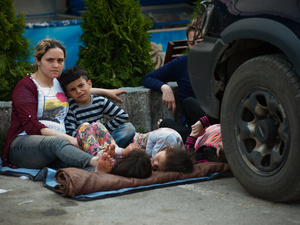More than 40 missing and feared drowned in latest Gulf of Aden boat tragedy
More than 40 missing and feared drowned in latest Gulf of Aden boat tragedy

In this photo from 2012, staff of the Society for Humanitarian Solidarity, a vital UNHCR partner, help survivors to shore in Yemen.
GENEVA, March 11 (UNHCR) - The UN refugee agency on Tuesday said 44 people were missing and feared drowned after a smugglers' boat capsized off the coast of southern Yemen in what UNHCR described as the worst such incident this year.
Spokesman Adrian Edwards said UNHCR was "deeply saddened" by the boat accident in the Gulf of Aden involving refugees and migrants. The boat was reportedly carrying 77 men, women and children from Somalia (31) and Ethiopia (46). "Thirty-three people were rescued, but the remaining 44 are still missing and feared drowned," Edwards said.
The boat is reported to have departed early last Friday from Bossasso in Puntland on the north coast of Somalia. It ran into strong winds and high waves off the coast of the southern Yemeni governorate of Shabwa. According to one of the survivors, the boat quickly filled with water and capsized.
On Sunday morning a marine patrol by UNHCR partner organization, the Society for Humanitarian Solidarity (SHS), found a number of survivors. Thirty-two people were picked up by early afternoon, and one more later in the day. Other passengers remain missing.
Edwards said that all but one of the survivors was male. They were brought ashore at Majdaha by SHS staff and given first aid, food, water and clothing before being taken to a transit centre. "One 45-year-old man from southern Somalia said he has lost his two children in the tragedy, unable to reach them in the dark. The sole surviving woman lost her teenage daughter. She said the smugglers had refused to stop the boat when it began taking on water," Edwards added.
The tragedy is the most significant involving refugees and migrants crossing the sea to Yemen in the past year. The number of people making the perilous journey has been declining. From 107,532 arrivals in 2012 the number fell to 65,319 in 2013, and only 2,717 are recorded in the first two months of this year.
"Nonetheless, the crossings continue and lives are being lost. And this calls for all stakeholders - governments, international and regional organizations, the donor community and civil society - to develop comprehensive responses to reduce and ultimately prevent these hazardous journeys," Edwards stressed.
Over the past five years, more than half-a-million people (mainly Somalis, Ethiopians and Eritreans) have crossed the dangerous waters of the Gulf of Aden and the Red Sea to reach Yemen. Reports abound of mistreatment, abuse, rape and torture by unscrupulous smuggling and trafficking rings. Boats crossing to Yemen are overcrowded, and smugglers have reportedly thrown passengers overboard to prevent capsizing or avoid detection. Search-and-rescue officials say the practice has resulted in hundreds of undocumented casualties in recent years.
UNHCR has urged countries in the region to implement measures to help identify refugees and other people with protection needs among those taking to the sea. UNHCR has also called on donor countries and civil society organizations to become more engaged in mixed-migration issues in the Horn of Africa, so as to improve humanitarian responses and help save lives.
The refugee agency has worked to enhance services offered to new arrivals in close collaboration with the Mixed Migration Task Force and other partners, including the government of Yemen, international and national non-governmental organizations and host communities at arrival points.












